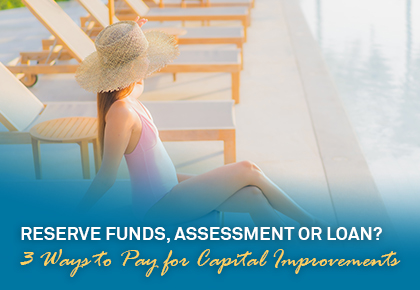-
5 Steps to the Best Reserve Study Firm
Nothing lasts forever and you need to have a plan to replace major items and systems before their lifespans end. How do you create that plan? Start with a quality reserve study. -
Riding the Storm Out: How Your Property Management Company Can Help With Hurricane Planning
In recent years, hurricanes have become so large that they can affect the entire state of Florida and move well into Georgia, causing loss of power, flooding or sustained damage. -
Slow and Steady: 5 Surprising Benefits of Raising Your Dues
It’s that time of year again – budget season is upon us. You know the things to consider when creating your budget, but what drives your process? Are you focused on achieving a particular vision for your community? Avoiding conflict in the community? Solely looking to avoid increasing dues? -
Repairs and Maintenance vs Capital Expenditure: What's the Difference?
It’s no secret that association management is a big job. Across Minnesota, common areas require a lot of routine maintenance to uphold community standards – things like exterior light bulb replacements, landscaping and paint touch-ups. Depending on your townhome community, the scale of your amenities' needs will vary. -
Can Your HOA Handle a Crisis? 8-Step Emergency Preparedness Plan
Is your association really prepared for an emergency? Learn how to develop an HOA emergency preparedness plan in 8 steps. -
Your HOA Board and Coronavirus: 5 Questions to Discuss
How should your HOA board handle a pandemic like COVID-19? Start by tackling these 5 questions.; -

Reserve Fund, Assessment or Loan: How to Pay for Capital Improvements
Great capital improvements improve property values. Read on to see the three ways to pay for them and the pros and cons. -
3 Strategies to Keep HOA Assessments Stable and Add Value
There are valid reasons to raise assessments, but in some cases, you may be able to go a different route. Here are three strategies to save your HOA money and keep assessments stable. -
Avoid These 4 Condo and Co-op Board Member Mistakes
Many condo and co-op board members make the same four mistakes. Find out what they are and what you should do instead -
Habitat Magazine-Communication and Training Are Key Before Disaster Strikes
In New York City, there are numerous safety regulations governing commercial buildings and hotels, but they do not apply to co-ops, condos, or other residential buildings. -
Email Communication Best Practices for Coronavirus Information
Here are some email communication best practices for your building to use when sending out communications regarding the current pandemic. -
Four Ways to Keep Your Building Safe and Clean
Living in close proximity to other people can come with challenges, especially during cold and flu season. -
Commercial Observer-Grading Buildings on Energy Consumption
A new law will require residential and commercial buildings to prove their energy efficiency -
Have You Asked Yourself, "Do I Need Flood Insurance in a High-Rise?"
High-rise buildings in New York City aren’t immune to flooding. Learn the basics of flood insurance and why your NYC high-rise needs it today! -
How to Hold Your Next Board Meeting Through Video Conferencing
It goes without saying that how we communicate has drastically switched from in-person contact to user-friendly digital platforms since the COVID-19 pandemic began to spread. -
The Ins & Outs of NYC Building Energy Rating and Energy Grades
FirstService Residential and FirstService Energy are prepared to help boards and owners identify capital improvements or retrofits that improve a building's energy efficiency score and letter grade. -

It’s Not Just Planning: Take Your High-rise Emergency Management to the Next Level
Planning for emergencies is step one. Your board also needs to know how to manage those New Jersey high-rise emergencies when they happen. -
Ways to Keep Your Community Safe During Tornado Season
Tornadoes are fearsome because of their unpredictable nature. Although there are certain weather conditions that make tornadoes more likely, such as severe summer thunderstorms, tornadoes can also be created by snowstorms and blizzards. They can strike at any time of year and almost any place, even forming on the water and moving onto land. -
Simple Energy Conservation Steps to Benefit Your Community This Winter
With the cold weather in the Ontario air we all would love to find ways to save money as condo owners. There are a lot of helpful tips that we as homeowners can start before winter arrives and continue during the remainder of the winter season. -
Ways to Keep Your Community Safe During Tornado Season
Tornadoes are fearsome because of their unpredictable nature. Although there are certain weather conditions that make tornadoes more likely, such as severe summer thunderstorms, tornadoes can also be created by snowstorms and blizzards. They can strike at any time of year and almost any place, even forming on the water and moving onto land. -
Ask the Expert: Homeowners and Condo Owners Association Reserve Study
View our third episode of Ask the Expert, featuring Andrew Stoutenburg, Regional Executive Director of Reserve Advisors, as he talks about the importance of reserve studies in financial planning. -
Crisis Management for your Texas Community After a Weather Event
Watch a quick video to discover how a property managment company with national resources can help your Texas community recover quickly after a major weather event. -
Hurricane Prep: Your Association Management Company and You
Everything is bigger in Texas & sometimes even hurricanes. And during hurricane season, being a board member for a residential community in the Houston area can bring some big challenges, too. To help get you and your community ready and reduce the effects if a hurricane does strike, we've put together six important tips. -
Is Your Community Prepared? Active Shooter Situations
Whether you live in a high-rise condominium in Austin, a gated community in San Antonio or an active adult community near Dallas, emergencies happen. As seen in the media over the past few years, such emergencies all may involve active shooters. Do you or your management team know what to do to protect residents in an active shooter situation?